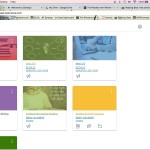So it’s the end of the school year. A delightful feeling of renewal is sprinkling down like magic as you look forward to summer break. You are probably putting together an epic summer To-Do list of projects, appointments, and fun times. I’d like to challenge you to add one more thing to your list: Have you examined your digital footprint lately?
According to Wikipedia, a digital footprint (a.k.a. digital shadow) “refers to one’s unique set of traceable digital activities, actions, contributions and communications that are manifested on the Internet or on digital devices.” A few years ago, I took a technology class with Dr. Teresa Foulger. For one assignment, we examined our digital footprint by typing our name in a Google search and looking through the results. (OK, yes…go ahead. Open another window and Google yourself right now!)
As I typed my name into the search and waited for the results, I had a feeling of excitement—and then worry—and then….disappointment. I stared at the computer and saw that virtually nothing in the results was actually about me. If you try this Google experiment and find limited search results, you might consider taking some active steps to improve your own digital footprint this summer.
On Dr. Foulger’s (free!) “Develop Your Digital Footprint” module, she writes: “You are a professional educator. Google should know that…your online identity needs to depict you as a highly qualified professional.” Personally, I couldn’t agree more. At a time when Arizona is decreasing the requirements for teacher certification, isn’t it important for highly qualified teachers to take active steps and show off what makes us highly qualified? Don’t we want to set ourselves apart as professionals?
Part of the Digital Footprint assignment involved creating my own professional website about myself as an educator. Back then, I remember thinking I’m not important enough to have my own professional website and I don’t know any teachers who have a website about themselves. But here’s the deal: I sucked it up and did the assignment—and the process was really transformative! It increased my feelings of professionalism, leadership, and teacher awesomeness. There was something about the sheer act of making the website that helped me realize I needed my own website. And now I’m convinced that all teachers should consider making their own, too.
If you are ready to take the plunge and create your own professional website, Dr. Foulger’s module is a very helpful guide. Within the module, there are links to many examples that might get your wheels turning. For me, I found that Weebly was a great free site that I could navigate easily to create the professional webpage I had in mind. Some other actions that have improved my digital footprint have been: I created a profile on LinkedIn, I maintain a classroom website (through PB works), I participate in Twitter discussions, and I’m sure to always log in before I post comments on blogs so that my name shows instead of “anonymous.”
Overall, I’ve learned that a digital footprint requires ongoing maintenance and intentional actions. Also, I’ve learned that these actions are worth it! Earlier this year, a substitute on my campus told me that she had “looked me up.” After I got over the shock (that she was interested enough to Google me!)—I was amazed to find out that she’d found many of my blogs and websites. That moment created a big shift in my thinking. It helped me realize that my digital footprint is part of my “teacher voice” that I can use as a tool to advance the profession, share my perspectives, and advocate for my students. Don’t let your teacher voice be silent when it comes to your digital footprint. Be bold and brave!
If you have thoughts or examples about increasing your digital footprint or creating a professional website, I hope you’ll share in the comments below. I’m looking forward to reading what Google says about YOU!










Comments 7
Jess this is really cool. I was just having a discussion the other day with some fellow educators in our field about how to elevate our standing in the community. I think non education people don’t really understand what it is that we do everyday, especially in the form of training and professional development. I think the image of our profession is important and needs to be protected, elevated, and marketed. Its going to be lots of small steps that will make this happen. I think by having a digital footprint you are proud of, will only help to serve your authority and standing as a skilled professional.
Thanks for the kind words, Mike. I was thinking more about this topic today and how a digital footprint also gives us credibility. For me, I think it increases my “fearlessness” as an educator so that I can speak about the issues I care about–and feel that people can easily know my values, goals, and beliefs about education if they check me out further. Perhaps this could decrease opportunities of being misunderstood (since those arise sometimes). Anyhow, I’m hoping we can spread this idea and increase the digital footprint of educators in Arizona!
I love this idea! I am not going to lie. I have googled myself several times over the years. I did not realize the connection between our footprint and our professional identity. Thank you for pointing it out to me.
Amen, my friend. Everything is out there: you either own it or let it own you.
TRUTH!
Google technology really very interesting for us and we got more services from here. So i think their new research will be more helpful for us.
So it’s been awhile since I took on this challenge. I’ve been working hard to increase my digital footprint these past few years. When I first took this challenge (probably in 2015), the first full page of Google results were another person named Jess Ledbetter. The only mention of me was one link on the second page. Now, I have four links on the first page of Google results that are me (and not the other person). Considering that the other person publishes music and videos online, it’s been a big challenge to compete with her web presence. I’m telling you friends: Being intentional about your digital footprint makes all the difference!